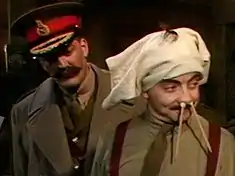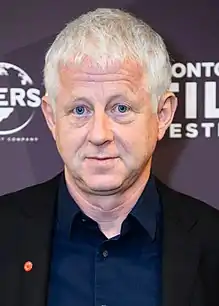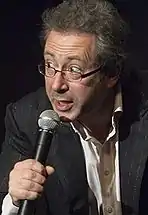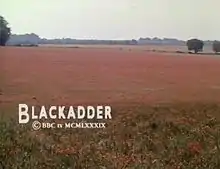Goodbyeee
"Goodbyeee", or "Plan F: Goodbyeee",[nb 1] is the sixth and final episode of Blackadder Goes Forth, the fourth series of British historical sitcom Blackadder. The episode was first broadcast on BBC1 in the United Kingdom on 2 November 1989, shortly before Armistice Day. Apart from the one-off short film Blackadder: Back & Forth made a decade later, it was the last episode of Blackadder to be produced and transmitted.
| "Goodbyeee" | |
|---|---|
| Blackadder episode | |
 General Melchett catches Blackadder pretending to be mad. Melchett represents the "lions led by donkeys" perception of the war,[1] and is an amalgam of Douglas Haig and John French, among others. | |
| Episode no. | Series 4 (Blackadder Goes Forth) Episode 6 |
| Directed by | Richard Boden |
| Written by | |
| Produced by | John Lloyd |
| Original air date | 2 November 1989 |
| Running time | 29 minutes |
| Guest appearance(s) | |
The episode depicts its main characters' final hours before a major British offensive on the Western Front of the First World War, and Captain Blackadder's attempts to escape his fate by feigning madness; after he fails to convince General Melchett, and Field Marshal Haig's advice proves useless, he resigns himself to taking part in the push. "Goodbyeee" has a darker tone than other episodes in the series, culminating in its acclaimed ending in which the main characters are assumed to die in machine-gun fire. The episode's theme of death ties in with the series' use of gallows humour, its criticism and satire of war, and its depiction of authority figures contentedly sending their subordinates to face the enemy, while unwilling to do so themselves.
Richard Curtis and Ben Elton wrote the episode, and further material was provided by cast members. Its final sequence, which shows the main characters going "over the top", uses slow motion, as the programme's creators were unhappy with the result of the scripted ending. The enhanced scene has been described as bold and highly poignant.[4]
Plot
Background

Each series of Blackadder depicts its protagonist, always a scheming and (except in the first series[5]) witty man named Edmund Blackadder, in different periods throughout history. In Blackadder Goes Forth, he is Captain Blackadder (Rowan Atkinson), an officer in the British Army on the Western Front during the First World War.
Joined by his colleagues—the poor, stupid and unhygienic Private Baldrick (Tony Robinson), and the overly optimistic, upper-class and equally idiotic Lieutenant George St Barleigh (Hugh Laurie)—Blackadder tries constantly to escape his position and avoid the "big push", which he fears will result in his death. His efforts are hindered by the loud and intimidating General Melchett (Stephen Fry) and Melchett's strict, sardonic, and jobsworth staff officer, Captain Darling (Tim McInnerny).
Events
Captain Blackadder's trench receives a phone call from HQ: a full-scale attack has been ordered for the next day at dawn. Realising that this is likely to mean his death, Blackadder plans to escape by pretending to be mad: he puts underpants on his head and sticks pencils in his nostrils. His plan is thwarted when General Melchett arrives to see what is happening and remarks that he shot an entire platoon that used this exact method; Blackadder overhears and narrowly escapes Melchett's punishment by pretending he is relating the story to Baldrick.
Melchett leaves after George declines his offer not to participate in the push, and Baldrick suggests that Blackadder ask Field Marshal Douglas Haig to get them out; remembering that Haig owes him a favour, Blackadder decides to call in the morning. George, Baldrick and Blackadder discuss the War and the friends they have lost—George mentions the Christmas truce of 1914 (in which the belligerents stopped fighting to play football) and realises he is the only "Trinity Tiddlers" member still alive; this is paralleled in Baldrick's pets, who have all died. Back at HQ, Melchett surprises Captain Darling with a front-line commission. Darling's pleas to reconsider are misinterpreted, and Melchett insists that he go.
The following morning, Blackadder calls Field Marshal Haig and reminds him of his debt; Haig reluctantly advises using the underpants method, and abruptly hangs up, sealing Blackadder's fate. Darling arrives, and his animosity with Blackadder dissolves as they are both put in the same situation. George tries to cheer everybody up, but finds himself as scared as the others. Darling states that he had hoped to live through the War, return to England and marry his fiancée.
—Captain Blackadder, on Baldrick's final plan[6]
The men are called to the trench to prepare for the big push. There is a moment of hope when the British barrage lifts, but Blackadder reminds his colleagues that they have stopped only to avoid hitting their own men. Baldrick tells Blackadder that he has a plan to escape certain death, but for the first time in any series, does not call it a "cunning plan". Blackadder replies Baldrick's idea will have to wait, but admits it couldn't fail to improve over his own plan to feign insanity because "who would have noticed another madman round here?" The series concludes with Blackadder earnestly wishing his comrades good luck, and they charge over the top into thunderous machine-gun fire. The sequence enters slow motion as a slow piano version of the Blackadder theme is played. The series ends as the violent chaos of no man's land fades into a tranquil field of poppies, with only birdsong to be heard.
Production


The episode was written by Richard Curtis and Ben Elton,[7] who swapped computer disks to make edits. They stuck to a rule whereby they could not add back material the other had removed. The script was collaboratively edited by the cast members of Blackadder Goes Forth during read-throughs.[8][9] Elton was primarily responsible for the sequence in which Blackadder explains how the First World War started;[10] the running gag of Baldrick using mud and bodily fluids to make coffee throughout the episode was greatly expanded during rehearsals.[11]
The episode's title is a reference to the popular First World War song "Good-bye-ee!",[12] which was based on a catchphrase of the comedian Harry Tate.[13] The song is also heard in an earlier episode — "Major Star". The title is a departure from those of previous Blackadder Goes Forth episodes, which are puns on military ranks.[14]
During the filming of the episode, which took place before a studio audience at BBC Television Centre,[8] Rowan Atkinson described sharing his character's dread of impending death and feeling a "knot in the pit of my stomach",[15][16] something that he had never experienced.[16] Hugh Laurie said that filming was sad because "even for comic effect, we were representing the deaths of hundreds of thousands of people".[9] Regarding guest star Geoffrey Palmer, the producer John Lloyd said "[We] probably could have given [him] more attention", calling him "a wonderful actor" who is "really just delivering three or four plot lines [pieces of dialogue essential to the plot]".[10]
The slow motion and fade effects at the end of the episode were not scripted,[17] but the decision to use them was made in editing after the final scene was hastily filmed on an unconvincing polystyrene set, ruining the poignancy of the sequence; the episode's director Richard Boden added the poppy field image.[9] The piano version of the theme tune was performed by Howard Goodall and recorded in a gymnasium, giving it what Lloyd described as a "liquid, lonely sound".[18] The episode's end credits were omitted.[8] Tim McInnerny did not know about these changes before the episode aired, and has said that he found the ending particularly emotional.[8]
Themes
In the episode, Field Marshal Haig is shown casually sweeping away toy soldiers with a dustpan and brush; BBC News Magazine's Finlo Rohrer called this a "visual allusion to his callousness", but quoted the historian Gary Sheffield as saying "The real Field Marshal Haig was certainly not a callous man. He was commanding the largest British army ever. Whatever he did, you ended up with lots and lots of casualties." Sheffield also noted that "Melchett is an amalgam of Haig and John French and the other generals", so Haig effectively "appears twice".[19] The series, especially the storyline of "Goodbyeee", often depicts the "lions led by donkeys" perception of the War, an element of Blackadder Goes Forth that has been criticised by historians.[1][20]
In his book The Great War, Ian F. W. Beckett also cited Sheffield: the latter commented that Blackadder Goes Forth was successful because "the characters and situations needed no explanation, so familiar was the audience with the received version of the war". Beckett noted the popularity of the episode's final scene, and compared it to a similarly popular scene from Dad's Army. He said that this comparison demonstrates the observation made by historian A. J. P. Taylor that the Second World War has been regarded as a "good war" in comparison to the first; he opined that "television producers...have much to answer for in the perpetuation of the image of the Great War as one in which a generation of 'lions' were needlessly sacrificed by the 'donkeys'".[21]

Producer John Lloyd cited the episode's lack of another major character as the reason they had time to "explore the relationships of the five principal people".[10] Atkinson said that the scene involving Darling's "ghastly realisation" of his commission was "very sad";[16] Lloyd commented "I love the fact that Captain Darling does have some compassion; he's not just a bureaucrat".[10] They noted that "all the comedy just goes away" upon Darling's arrival in the trench,[10] and that "there are still funny moments, but dramatically, there is no comic content, it is just leading inexorably to the end."[16]
Comparing the ending scene to those of previous series of Blackadder, in which the main characters were also killed, writer Curtis commented: "I think it was by chance that [previous series] ended with Blackadder being killed...but series four, we did do it very much on purpose." He said that he and Elton felt they could use the First World War as a setting if the characters died, considering "if we did do that...it would not be too disrespectful, and would actually represent some of the tragedy of the First World War".[22]
Reception
Following its original broadcast on BBC1 at 9:30 pm on 2 November 1989,[7] "Goodbyeee" was praised for its powerful and memorable ending.[23] One journalist called the scene "a classy ending to a television classic",[24] and the Sunday Times said that it was "brave" and "properly responsible" of the writers to end the series poignantly, especially when the episode aired close to Remembrance Day.[24]
"Goodbyeee" has also been the subject of more recent reviews: Rob Cromwell of The Guardian listed the final scene among six "perfect end-of-show finales", saying of Blackadder: "It was brilliantly funny throughout, right up until the last 60 seconds", and praising the writers and producer Lloyd for "deliver[ing] a perfectly pitched, poignant ending".[25] Comparing Blackadder Goes Forth to the 2012 war serial Birdsong, Alison Graham of the Radio Times commented that "Nothing...evokes the terror of those unspeakable battlefields or leaves such an overwhelming sense of loss as [its characters] going over the top to their certain death".[26] Den of Geek's Carley Tauchert placed the episode second on her list of "top 10 TV show endings", calling it "one of the greatest interpretations of the madness of war that has ever been put on film".[27] Reviewing the episode for The A.V. Club, Kate Kulzick described it as "...a masterpiece, a hilarious and painful crystallization of everything Blackadder does well. It is without a doubt the best episode of the series and more than that, it is one of the best series finales in television history". She particularly praised it for "...its masterful balancing of comedy and tragedy. Both are interspersed throughout, with each character given moments of laugh out loud brilliance and poignant reflection", concluding that "...there is no such thing as a perfect television show or episode, but “Goodbyeee” comes dang close".[28] The academic and theatre director Mary Luckhurst contrasted the regular British comedic treatment of the Second World War with the absence of comedies set in the First World War, until the Blackadder series, which she considered "an important British dramatic treatment" of the War. Of the final episode Luckhurst wrote:
"Goodbyeee" went a good deal further than any other sitcom or comedy, by terminally sending pretty much the entire cast over the top in 1917, into a silence that has...endured ever since. Many millions of viewers were shocked, and almost all taken aback by the abrupt realization of tragedy amid much-loved national television and after riotous laughter to that sudden and bitter end ...[29]
In a poll conducted by Channel 4 and The Observer to determine television's one hundred most memorable moments, the final scene of "Goodbyeee" came ninth; it was one of only two entries in the top ten that was not news coverage (the other being a scene from Only Fools and Horses).[24][30] In 2001, Radio Times asked a panel of comedians, writers and producers to pick their ‘50 favourite sitcom moments’; "Goodbyeee" was the only episode of Blackadder that was included, where it ranked eleventh.[31] The British Film Institute's Screenonline called the episode's ending "unexpectedly moving", and noted that, unusually for a comedy programme, it was repeated as part of a serious commemoration of Armistice Day:[32] for its 80th anniversary in 1998.[33] The series' overview from the website of UKTV's channel Gold, which airs repeats of Blackadder, calls the final episode "a seamless blend of gallows humour and rich poignancy" and "a fitting end to an iconic series".[17] In his segment advocating for Blackadder to be voted Britain's Best Sitcom, broadcaster and journalist John Sergeant called the final sequence "the one sitcom moment with claims to immortality".[8]
Some historians of the First World War have taken a different view. William Philpott referred to the series, by name, as "bathetic" and felt it part of a "post-facto generalisation of the nature of their war" that "sucked in" even veterans of the conflict; in other words, the First World War soldier had become a "victim" in the public consciousness, a circumstance at odds with the historical record.[34] The impact of Blackadder on the public consciousness was so pervasive that Gordon Corrigan referenced it in his book cover copy when he published Mud, Blood, and Poppycock, which was an attempt to "dispel various myths" about the war.[35]
Notes
Footnotes
Citations
- Stirling, Marie (20 September 2011). "'Haig is about to make yet another gargantuan effort to move his drinks cabinet six inches closer to Berlin': Blackadder Goes Forth". New Histories. University of Sheffield. Archived from the original on 31 October 2014. Retrieved 22 September 2012.
- "Plan F – Goodbyeee". BBC. Retrieved 23 September 2012.
- "Series 4: Plan F – Goodbyeee". Radio Times. Archived from the original on 26 February 2013. Retrieved 30 July 2013.
- https://www.bbc.co.uk/comedy/blackaddergoesforth/
- "The Black Adder". Comedy. BBC. Retrieved 24 September 2012.
- Boden, Richard (director) (2 November 1989). Goodbyeee. Blackadder Goes Forth (Television episode). BBC1. Event occurs at 28:06–28:14.
- Lewisohn, Mark (2004). "Blackadder Goes Forth". BBC Guide to Comedy. BBC. Archived from the original on 11 April 2005. Retrieved 30 September 2012.
- Sergeant, John (presenter) (10 January 2004). Britain's Best Sitcom: Blackadder. Britain's Best Sitcom. BBC One. Archived from the original on 12 November 2013.
- Blackadder Exclusive: The Whole Rotten Saga (Television special). Gold. 9 October 2008.
- Lloyd, John. Audio commentary for "Goodbyeee" in Blackadder Remastered: The Ultimate Edition (DVD). 2 Entertain. 2009.
- Blackadder Rides Again (Television special). BBC One. 25 December 2008.
- Roberts 2012, p. 312.
- Richard Anthony Baker (2014), British Music Hall: An Illustrated History, Pen and Sword, p. 146, ISBN 9781473837188
- Roberts 2012, p. 313.
- Smith, David (28 December 2008). "Fagin goes forth in the West End". The Observer. Retrieved 22 September 2012.
- Atkinson, Rowan. Audio commentary for "Goodbyeee" in Blackadder Remastered: The Ultimate Edition (DVD). 2 Entertain. 2009.
- "Blackadder Goes Forth". UKTV. Retrieved 28 September 2012.
- Roberts 2012, p. 320.
- Rohrer, Finlo (15 June 2013). "How accurately does Blackadder reflect history?". BBC News Magazine. BBC. Retrieved 3 September 2013.
- Badsey, Stephen (2002). "The Great War Since The Great War". Historical Journal of Film, Radio and Television. Routledge. 22 (1): 41. doi:10.1080/01439680220120273.
- Beckett, Ian F. W. (2007). The Great War, 1914–1918. Longman. pp. 642–643. ISBN 978-1-4058-1252-8.
- Baker, Sara. "Blackadder Goes Forth". Clio's Eye. Stephen F. Austin State University. Archived from the original on 1 September 2009. Retrieved 29 September 2012.
- "Blackadder Goes Forth". Comedy. BBC. Archived from the original on 3 August 2014. Retrieved 23 September 2012.
- Hanna 2009, pp. 133–134.
- Cromwell, Rob (6 October 2011). "Six to watch: perfect end-of-show finales". The Guardian. Retrieved 28 September 2012.
- Graham, Alison (5 February 2012). "Blackadder Goes Forth was more powerful than Birdsong". Radio Times. Retrieved 4 October 2012.
- Tauchert, Carley (7 March 2011). "The top 10 TV show endings". Den of Geek. Retrieved 4 October 2012.
- Kulzick, Kate (5 September 2014). "Blackadder: "General Hospital"/"Back & Forth"/"Goodbyeee"". The A.V. Club. Retrieved 6 February 2017.
- Luckhurst, Mary (2006). "A wounded stage: drama and World War I". In Mary Luckhurst (ed.). A Companion to Modern British and Irish Drama: 1880–2005. Blackwell Publishing. p. 313. ISBN 978-1-4051-2228-3.
- ignored_one (13 September 2003). "The Observer 100 Greatest (UK) TV Moments". www.jehovahs-witness.com. Retrieved 10 November 2020.
- Courtis, Brian (7 June 2001). "Divine Comedy". The Age. p. 8.
- Brooke, Michael. "Blackadder". Screenonline. British Film Institute. Retrieved 30 September 2012.
- Hanna 2009, pp. 23.
- Philpott, William (2009). "Memory Fades". Bloody Victory: The Sacrifice on the Somme. Abacus Press. p. 613. ISBN 978-0-349-12004-1.
- google books website The copy noted that "Corrigan's brilliant, witty history reveals how out of touch we have become with the soldiers of 1914-18. They simply would not recognize the way their generation is depicted on television..."
References
- Hanna, Emma (2009). The Great War on the Small Screen: Representing the First World War in Contemporary Britain. Edinburgh University Press. ISBN 978-0-7486-3389-0.
- Roberts, J. F. (2012). The True History of the Black Adder: The Unadulterated Tale of the Creation of a Comedy Legend. Preface Publishing. ISBN 978-1-84809-346-1.